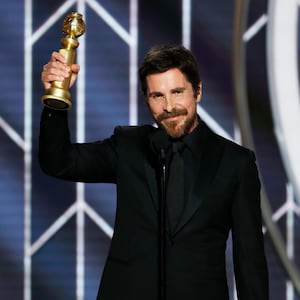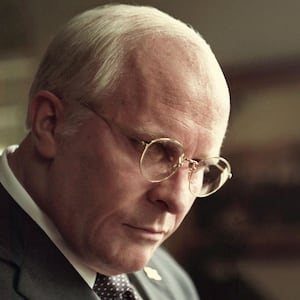This awards season thus far has been a scorching, sizzling, flaming mess. Sunday night’s Golden Globe Awards just gleefully leaped onto the fire.
From the Oscars’ host fiasco to terrible, tone-deaf films becoming category frontrunners, to the struggle to find continued meaning and gravitas a year after the galvanizing first #MeToo-era ceremonies, the Golden Globes was already set in stormy weather. But it also had the potential to clear the skies to much-needed sunshine.
There was tangible excitement for hosts Andy Samberg and Sandra Oh, an unlikely and beloved pair. This is the venue where Meryl Streep and Oprah Winfrey delivered acceptance speeches that doubled as rousing sermons dictating our entire national discourse. Even the Globes’ notorious kookiness was promising: Times are tough, but at the very least we’ll probably get to see Lady Gaga take home an award. What fun!
Instead, the show flung trophies to inexcusably problematic and misguided films: Bohemian Rhapsody and Green Book took the Best Picture categories, while Christian Bale won for Vice. And in the end, the ceremony was so bizarrely paced with no cohesive sense of spirit, purpose, or tone that not even the winsome charm and charisma of Samberg and Oh—and that is a considerable amount of charm and charisma—could rescue it.
Because of the Globes’ penchant for bonkers winners and laughable pandering to stars, there’s always been a tendency to tune in for the boozy party and dismiss the wacko honorees with a laugh and an eye-roll.
So it’s tempting to again joke, “LOL Golden Globes, you’re drunk,” like we do every year, but if these major awards for Bohemian Rhapsody trick anyone into thinking that the film is good, or anything but an insult to Freddie Mercury’s legacy, then that is a travesty. A similar argument could be made for the Hallmark-card racial discourse that happens in Green Book, a movie which has been disowned by one of its subject’s families, and certainly of Vice, an infuriating, sophomoric misfire in every way.
Moviegoers curating their film queues and ensuing cultural conversations deserve better than a Bohemian Rhapsody producer touting the film’s “authenticity and inclusivity” after its latent gay-shaming and preposterous fudging of facts. Or the guy who made Shallow Hal insinuating that his film shows us all how racism could be solved: “All we have to do is talk!”
Yes, Alfonso Cuarón won twice for his beautiful Roma. Olivia Colman’s win for The Favourite couldn’t have been more deserved and gifted us with the most delightful lines of the night, from the “thank you for the sandwiches” opener to her shout-out to her “bitches,” Emma Stone and Rachel Weisz.
Glenn Close’s Best Actress win for The Wife was a shock in a category opposite Lady Gaga, but so earned that even the A Star Is Born actress was visibly moved for her, sharing a gracious moment with Close before she took the stage to deliver the ceremony’s most moving and memorable speech.
Mrs. Maisel’s Rachel Brosnahan? The Assassination of Gianni Versace? Sandra Oh for Killing Eve? The Americans? All worthy winners.
But even on the TV side, one could scratch one’s head for days over Netflix’s buzz-less The Kominsky Method winning so many trophies over the work done on The Good Place, The Marvelous Mrs. Maisel, Barry, or Atlanta—which was, confusingly, not even nominated. Or how the spectacular Billy Porter could lose any acting award in which he was nominated for his work on Pose. (Bodyguard’s Richard Madden took that one.)
Asinine winners are one thing. But even from an entertainment standpoint, the telecast faltered.
Things got off to a promising start with Samberg and Oh, who opened the ceremony by leaning gamely and aggressively into the role we wanted them to fill: the Goofy Nice Guys.
“I know what you’re thinking. Andy Samberg and Sandra Oh. The two nicest people in show business? This thing is going to be a snooze…” Samberg joked before the two “roasted” the room by hyperbolically fawning over them. (“Hey Jeff, I wish you were my dad,” he told Jeff Bridges.)
It was cute, and if it went on a hair too long, I didn’t mind. After approximately 475 years of award-show hosting defined by cynicism, jadedness, or wryness, their unbridled, joyful enthusiasm was a welcome—if to some, initially jarring—change of pace.
The pair’s dorky silliness was so lovely, in fact, that when they went off-book in terms of tone, it induced a bit of whiplash. It’s not that they couldn’t land jokes with an edge. Oh’s advising to “break out the tissues because you’re going to want to masturbate to all of them” when introducing the cast of This Is Us was an A+ award-show joke.
But Samberg’s tease that The Big Bang Theory was there with “a surprising takedown of Les Moonves” seemed the kind of mean-spirited thing the duo was hired precisely not to engage in... even if the cast’s sallow faces right after were rather priceless. The same could be said for his crack about Mrs. Maisel being anti-Semitic, which seemed unearned given the tenor of their set.
And even if it came abruptly—audience members not realizing it was a serious moment could be heard giggling—Oh’s stirring words about what it means for her to be on stage that night could have, coming after what we thought was a largely successful monologue, set the tone for how the ceremony would balance laughs, the business at hand, and addressing social and cultural issues in the room.
“I said yes to the fear of being on this stage tonight because I wanted to be here and look out onto this audience and witness this moment of change,” she said. “I’m not fooling myself. Next year could be different and probably will be. But right now, this moment is real.”
Yet even on that ground, the ceremony was a letdown. It’s not that all award shows need to double as a call to arms or a fancy-dress State of the Union on race, gender politics, sexual assault, and the dangers of the Trump administration.
But the haphazardness with which those things were addressed Sunday night reveals that the industry is struggling to figure out just how loud its megaphone should be. The starting gun has sounded. What energy should be used now during the less exciting, less attention-grabbing—though still vital—stretch of the race?
There was If Beale Street Could Talk winner Regina King, the only person to mention the Time’s Up movement on stage, who pledged to commit to hiring a staff of at least 50 percent women on all of the projects she produces going forward, urging others in the room to do the same.
Glenn Close’s speech for The Wife used emotion and harsh truths to make necessary points about sexism and erasure. “It was called The Wife. I think that’s why it took 14 years to get made,” she said. Then, talking about her mother’s confession in her eighties that she felt like she hadn’t accomplished anything, she urged women “to find personal fulfillment,” to “follow our dreams and say, ‘I can do that,’ and ‘I should be allowed to do that.’”
On the Best Actor side, there was Christian Bale’s speech for Vice. The movie is garbage, but his speech was breezy and entertaining—shout-out to his kids... Banana and Burrito?—while taking the kinds of barbed shots you want from an actor winning for playing Dick Cheney in a biopic. “Thank you Satan for giving me inspiration on how to play this role,” he said, while joking that he might next play fellow “charisma-free asshole” Mitch McConnell.
We’re sure someone will correct us if we’re wrong, but I don’t believe Donald Trump’s name was mentioned once. Is that a good or bad thing? Unsure! But coming a year after a Golden Globes ceremony that so admirably revealed the potential for an award show that could address politics and important issues with dignity and intent while still being celebratory and glamorous, it’s pretty glaring how awkwardly Sunday’s show grappled with its identity crisis.
Jeff Bridge’s daffy listing of names and memories while accepting his Cecil B. DeMille Award was endearing and fun, for example. But it’s worth noting that it was the same platform that Winfrey and Streep were given in the last two years, and which they used to activate their fellow liberals. (Not saying that his comparing the impact of a small trim tab propeller on steering a huge tanker to the effect one person can have on the world wasn’t inspiring... if you could follow it.)
It goes without saying that these telecasts are increasingly impossible to execute amid so many competing demands from audiences: Be political! Shut up about politics! Be fun! Be somber! Go back to making it about the movies! No one cares about the movies! It’s truly a miracle that Samberg and Oh fared as well as they did. That the telecast failed ultimately is not on them. It’s on the Hollywood Foreign Press itself.
For years, the random habits of the group have been dissected, with no one able to make much sense of their taste. That once seemed like an innocuous problem on a trivial, Champagne-soaked night. Now it’s a liability.
Movies matter, TV series matter, and award shows matter. That’s the case now more than ever, as the industry recalibrates itself to better represent and give opportunity to the kind of diversity that the world needs to see reflected. It needs to see it reflected so it can be validated, educated, and moved to change. Award shows are largely about politics—or, in the case of the Globes, utter randomness. But they do carry a measure of responsibility, and increasingly so.
The major choices made Sunday night reflect a shameful lack of responsibility. To put a spin on the popular comic-book adage, perhaps now it’s time to strip the organization of its power, too.






